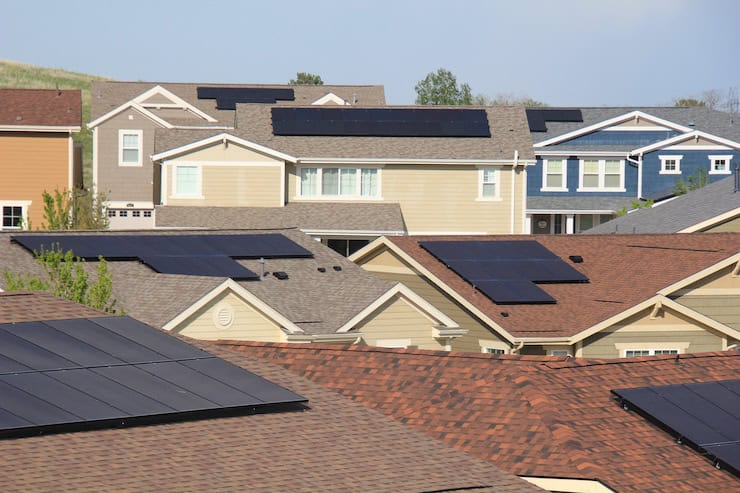Renewable developer says Trump’s energy policies will impair badly needed economic development in rural communities
by Allen Best
Taylor Henderson has worked across Colorado in both development of wind, solar, and storage as well as transmission. This year alone he has put 14,000 miles on his pickup driving to places such as Limon and Fort Morgan, Crested Butte, and Burlington.
At Outshine Energy, which Henderson founded, he calls himself the “local energizing officer.” Henderson’s projects tend to be larger in scale than residential rooftop. As such, his work will not be impacted directly by the EPA plans to terminate funding for the Solar For All program.
This announcement is part of a broader effort by the Trump administration to roll back support for renewable energy. And that, says Henderson, will harm rural Colorado on both sides of the Continental Divide but particularly the farming counties of the eastern plains that need additional property tax assessments to pay for schools, roads, and other community infrastructure.
“Some of these counties are the size of Rhode Island,” he points out. “It’s no small feat to take care of these places.”
Henderson compares the renewable energy potential of rural Colorado to the gold and silver mines that put economic feet under the new state of Colorado in the 18th century.
Already, renewable generation provides 45% of the property tax base in Lincoln County, which is bisected by Interstate 70 in the area of Limon. Farther east, along the Kansas border, the ratio is even higher in Kit Carson County. With new demand for data centers in particular, Colorado’s Fourth Congressional District — which is represented by Rep. Lauren Boebert — could profit enormously.
“You are literally talking about a gold mine of opportunity on the eastern plains of Colorado and throughout the state,” he said.

Renewable generation, including these wind turbines north of I-70 in Lincoln County, have substantially bolstered the tax base of Colorado’s rural counties. Immediately in question is EPA funding for rooftop and community solar program. Photos/Allen Best
The EPA yesterday announced plans to terminate $7 billion in funding for Solar for All programs across the nation. Colorado had been awarded $156 million in July 2024 to establish that program. This program had been established by the federal Inflation Reduction Act of 2022.
The Trump administration earlier this year had frozen other federal funding. Colorado, along with 22 other states and the District of Columbia, contested this freeze in courts. That particular case involved funds from the Federal Energy Management Administration. A U.S. District Court judge ruled in April that the federal agency had improperly withheld the funds.
The Hill pointed out in a story yesterday that the EPA had previously sought to claw back $20 billion in “Green Bank” funding that, like Solar for All, has already been distributed to various organizations.
That, however, was before passage of the “One Big Beautiful Bill” Act, which repealed “unobligated balances” from the $7 billion fund. The EPA’s action, said the Hill, could trigger a legal battle about what constitutes “unobligated” money that is subject to repeal.
The EPA administrator, Lee Zeldin, argued in a video posted to a social media site that his agency “no longer has the authority to administer the program or the appropriated funds to keep this boondoggle alive.”
Pushing back
However, at least some would-be recipients have vowed to push back. “I refuse to let it be ripped away without a fight,” said Arizona Gov. Katie Hobbs in a statement, “President Trump ran on lowering costs and creating jobs. Gutting Solar for All will do the opposite. I urge the Trump administration to reverse this reckless decision that will make our air dirtier, our energy bills higher, and our economy weaker.”
Colorado Gov. Jared Polis used similar language.
“Once again the Trump Administration is seeking to rip cost-saving solutions out of the hands of hardworking Coloradans and push us backwards into an over-reliance on non-renewable resources,” said Polis in a statement issued Thursday morning. “Solar for All reduces electricity costs — particularly for low-income households. But if this misguided federal decision happens, it will do the exact opposite, costing communities across our state.”
The Colorado Energy Office Thursday evening was formally notified of the termination of funding.
“We are reviewing the notice and evaluating next steps,” said Polis spokesperson Eric Maruyama. “We have defended against illegal federal cuts to appropriated congressional funds in court before and are actively reviewing our options in this instance as well.”
Colorado had put together a Solar for All program and issued a request for proposals. It was set to dedicate 75% of the awarded funds toward financial assistance to low-income houses for access to residential rooftop and community solar.
The program aimed to expand access to solar to more than 20,000 Coloradans. Nationally, it was projected to provide access to solar power to 900,000 households.
In Colorado, the funds win ere to have been deployed through a combination of fully subsidized grants, low-interest loans and incentives to allow the benefits to flow to qualifying Colorado residents. The Colorado Energy Office was drafting grant solicitations for the single-family rooftop ($18 million), loans to third-party owners for single and multi-family ($55 million) and workforce development ($11.5 million).
As the New York Times observes, on his first day in office, President Donald Trump issued an executive order declaring a national energy emergency. The emergency, however, has been selective. His administration has been withdrawing federal support for most forms of renewable energy while encouraging the production and consumption of fossil fuels.
Disservice to constituents
From his Denver office, Henderson reported meeting this week with a rancher in Morgan County. The impacts of the shift in federal policy, he said, will make that particular project harder to get done.
“I agree with the president on a lot of things, but I am really upset about this,” the Morgan County rancher said, referring to the One Big Beautiful Bill and the subsequent executive order.
Henderson added that he supports an “all-of-the-above energy strategy. We’re going to need traditional fossil assets to bridge to the future.”
But for a member of Congress representing eastern Colorado to support the withdrawal of federal support for renewable energy, he said, is a disservice to the constituents in that district.
For the record, he named no names.
- Colorado tops 6 million - January 28, 2026
- Difficult decisions on Colorado’s eastern plains - January 26, 2026
- Xcel can fix downed coal unit at Pueblo but at what cost? - January 22, 2026






